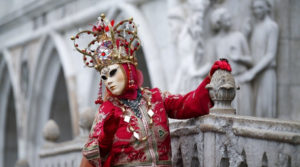 January has never been my favorite month. I have always seen this time of year as a long cold stretch of days where very little that is interesting happens. In contrast, my favorite time of year is the period between October and the end of December which is filled with holidays and celebrations and the air is permeated with magic and excitement. By the end of January and into February, I begin to look forward to the Carnival Season which is a time or magic, merriment, decadence and excess which provides much welcome relief from the long dragging days of winter. In the United States, we are most familiar with Mardi Gras in New Orleans, but Carnival is in fact celebrated in many places around the world in a variety of ways and traditionally was a period of indulgence and letting loose before the rigorous fasting and penitence of Lent began. It may seem strange to discuss Carnival here, since this blog is dedicated to spiritual and magical matters, but I feel that Carnival itself is a season of magic and happiness and therefore should be embraced and celebrated.
January has never been my favorite month. I have always seen this time of year as a long cold stretch of days where very little that is interesting happens. In contrast, my favorite time of year is the period between October and the end of December which is filled with holidays and celebrations and the air is permeated with magic and excitement. By the end of January and into February, I begin to look forward to the Carnival Season which is a time or magic, merriment, decadence and excess which provides much welcome relief from the long dragging days of winter. In the United States, we are most familiar with Mardi Gras in New Orleans, but Carnival is in fact celebrated in many places around the world in a variety of ways and traditionally was a period of indulgence and letting loose before the rigorous fasting and penitence of Lent began. It may seem strange to discuss Carnival here, since this blog is dedicated to spiritual and magical matters, but I feel that Carnival itself is a season of magic and happiness and therefore should be embraced and celebrated.
 Carnival is believed to have been celebrated as early as the 4th century as Christianity spread throughout Europe and the penitential season of Lent was kept by large segments of the population. Carnival was never a church sponsored celebration but an example of European folk culture possibly retaining elements of pre-Christian festivals. Lent was, and still is for many Christians, a season of strict penance and abstinence in preparation for Easter and the preceding Carnival period was a time to consume meat, alcohol and pastries in excess. It also became common to wear masks and costumes for an added sense of excitement and anonymity. Some Carnival celebrations became absolutely orgiastic and certainly by the 20th century there was an element of political satire and criticism of those in power which lend to the suppression if not outright banning of Carnival celebrations in fascist regimes such as that of Francisco Franco in Spain. Today Carnival remains a season of merriment, revelry and magic during which people often allow themselves to express desires and aspects of their personalities that often remain hidden the rest of the year.
Carnival is believed to have been celebrated as early as the 4th century as Christianity spread throughout Europe and the penitential season of Lent was kept by large segments of the population. Carnival was never a church sponsored celebration but an example of European folk culture possibly retaining elements of pre-Christian festivals. Lent was, and still is for many Christians, a season of strict penance and abstinence in preparation for Easter and the preceding Carnival period was a time to consume meat, alcohol and pastries in excess. It also became common to wear masks and costumes for an added sense of excitement and anonymity. Some Carnival celebrations became absolutely orgiastic and certainly by the 20th century there was an element of political satire and criticism of those in power which lend to the suppression if not outright banning of Carnival celebrations in fascist regimes such as that of Francisco Franco in Spain. Today Carnival remains a season of merriment, revelry and magic during which people often allow themselves to express desires and aspects of their personalities that often remain hidden the rest of the year.
Carnival technically begins on January 6th, the Feast of the Epiphany, which is the closing of the Christmas season and lasts until Fat Tuesday, the day before Ash Wednesday which marks the beginning of Lent. As Fat Tuesday approaches the costume balls and parades intensify and become more decadent and extravagant. There are many traditions particular to different parts of the world. In England, it is common to make pancakes on Fat Tuesday in remembrance of a legend surrounding a housewife in the village on Olney in Buckinghamshire in 1445 who was making pancakes and realized she was late for a church service and ran from the house still carrying the pancakes in the frying pan. To this day in Olney, there is a race through the village center where local women run carrying frying pans and pancakes. In Venice, Italy, which is known for its large and extravagant Carnival, it is a custom to wear garish and elaborate costumes and masks that preserve one’s anonymity on that night. New Orleans is known for its lavish parades with participants bedecked in spectacular costumes that often take an entire year to make. New Orleans’ Mardi Gras events and parades are organized by local guilds known as “krewes” to whom certain families have belong for many generations. It is also a tradition to throw strands of purple, green and gold beads symbolizing justice, faith and power respectively to those attending the parades. In Poland, Austria and Germany it is common to make donuts in the days preceding Fat Tuesday, a custom dating back to the days when Lent was rigorously observed and people wanted to use all remaining lard and dairy products before the coming fast. In Spain, at the end of Carnival on Ash Wednesday, in many locations there exists a tradition where a sardine or an artistic representation thereof in buried in a mock funeral procession representing the end of the season of excess and the beginning of Lent when penance and sacrifice lead to new life. There are just a few examples of the traditions surrounding the Carnival season as wherever it is celebrated, this magical time of year takes on its own local spirit and flavor.
I hope you have enjoyed this post about the Carnival season and that you do something decadent and indulgent to celebrate this magical and special time of year. As always I wish you peace, happiness and abundant blessings!